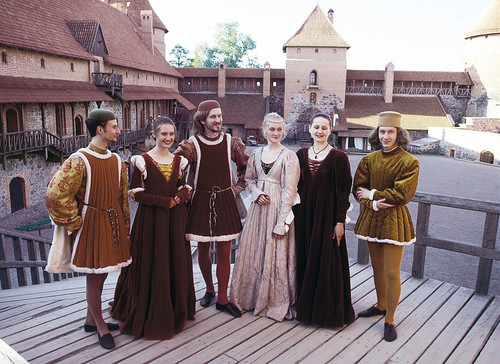Liberty or Equality: Would you feast at a medieval banquet or dine in a modern democracy?
Imagine, writes the erudite monarchist philosopher, Erik von Kühnelt-Leddihn (1909—1999), in Liberty or Equality, a tale of two feasts:

Let us conjure up the memory of a late medieval feast. The guests have arrived in a great variety of clothes, and even the costumes of the males show the most adventurous diversity. But they all would have belonged to one faith (devout Catholicism) and one basic ideology (feudal monarchism). Based on this common denominator, one might expect a relatively homogenous pattern of behaviour and conformity and not a society where liberty, individualism and the creative impulse flourished.
Yet we can very well imagine a dinner given in a "modern democracy" in which all the men arrive in black tuxedo uniforms, all of them with clean-shaven faces, all of them uttering in unison with parrot-like monotony the same identical political and social clichés. After some questioning and investigation one would nevertheless find that this monotony stems from a chaotic cauldron of the most varied religions and philosophies. If a deist Mason, a Catholic, a Barthian, a vegetarian with Hinduist notions, and a "Freethinker" consider it as natural that they all believe in equality, majority rule, compulsory education and "progress" - then we have to doubt sincerely not only the logicalitv of their capacity to think, but also their real freedom of thinking!
 Vice-Regal Saint:
Vice-Regal Saint: 








































.gif)

.gif)















































































































7 comments:
What is the point of this?
In my rush to post, I guess I didn't provide enough context, but the author was pointing out that the old monarchies were much freer societies and that majority rule democracies are actually sly forms of enslavement. The emasculated monarchies that we have today are powerless to safeguard individual liberties against the levelling tendencies of popular elected people's mandates, and the idea that people actually have a say in their parliaments is pure fiction. Pore a bucket of water in Lake Superior and see the water rise.
His criticism is that modern democracies result in nothing more than the low drive for sameness, and are therefore more synonymous with equality than liberty. As such he was an avowed monarchist and declared himself an enemy of all forms of totalitarianism, including the sly tyranny of democractic "mandates".
A king would never have countenanced an end to foxhunting, a prohibition on alcohol or an income tax, but democracies pass all kinds of things without batting an eye.
I rather think that the enjoyment and variation depends principally on whether one is a diner or a waiter.
Personally I find many interesting and challenging variations in my dinner company, even if we do all wear a suit and tie. From this I can only conclude that the quality of a dining experience rises and falls not on the historical period and associated variation of attire, but on the calibre of the dining membership.
Dullards in the renaissance will only talk of stag hunting and riding, dullards in our era will only talk of credit crunch and economy, but in a good dining club in any era there will be much to enjoy!
I think you took the bite out of this post, Invictus, from which it cannot recover.
Speaking of taking a bite (and then washing it down), before your question can reasonably be answered, I need to know:
Did they have nachos, ice cold beer, and pumpkin pie in those days?
Did they have nachos, ice cold beer, and pumpkin pie in those days?
Gentlemen,
I don't know about our editor, but I now yield completely!
Of course, modern democracy is to credit for our comforts. Why didn't I think of that before?!? And modern advances of medicine, technology, and dentistry are due to the high taxes of our times.
Post hoc ergo propter hoc!
Post a Comment